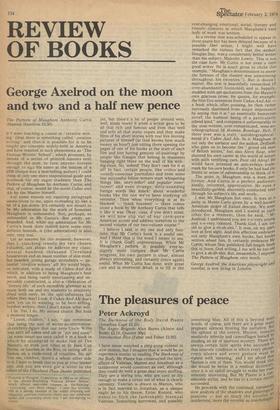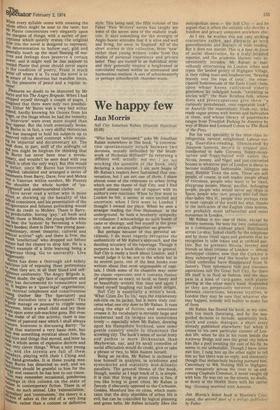The pleasures of peace
Peter Ackroyd
The Darkness of the Body David Plante (Jonathan Cape E2.25) The Angry Brigade Alan Burns (Alison and Busby E2.10, Quartet 50p) Introduction Five (Faber and Faber £2.95) I have never watched a ping-pong contest in slow motion, but I imagine that it would be an experience similar to reading The Darkness of the Body. Mr Plante has constructed the loveaffairs of Valerian, Marion and Jonathan as a taxidermist would construct an owl, although they could do with a great deal more stuffing. They are a boring trio, who are cool or fey enough to make a virtue out of what is clearly necessity. Valerian is drawn to Marion, who is in fact married to Jonathan, as a sleeper might be to his dream. Enter Ronald, who wants to filch the fashionably bisexual Valerian. Something borrowed, and possibly something blue. All of this is beyond mere words, of course, and there are a great manY pregnant silences littering the narrative. But the sphinx at the centre, Marion, remains resolutely infertile and camouflages herself IV exuding an air of spurious mystery. There are always certain faint spirits who succumb td that neurotic condition in which every phras,e; every silence and every gesture must "'t replete with 'meaning,' and I am afraid Oa, Marion is one of them. You would think tha' she would be better in a medical diction'Y' since it is an uphill struggle to make her even remotely interesting. But Mr Plante is a Olt; siderable stylist, and he has to a certain ekten succeeded. He proceeds with the continual, consistenti slow analysis of the shadows and gleanings passions — not so much the novelist taxidermist, more the novelist as conchologis` When every syllable oozes with meaning the Whole effect might be sour to the taste, but Mr Plante concentrates very elegantly upon tbe margins of things, with a surfeit of percyPtions which quietly erases the original little trio the novel is designed to represent. His determination to hollow out, gild and generally touch up the most fleeting of motives and feelings does preserve a certain Pnwer, and it might well be lese majeste to remind Plante that prose should never aspire to the condition of poetry. Prose is much better off where it is. To read the novel is to
aware of its decorous but manifest limits. ttn, the pleasures of peace and a regular income!
Pleasures no doubt to be shattered by Mr Burns and his The Angry Brigade. When I had hipped myself through a couple of pages, I agined that there were only two possibilines. Either Mr Burns was a very bad writer loindeed, hardly knowing his Onions from his oget, or the thugs whom he had the temerity to 'interview' were even more stupid than „tileY appear. But the truth eventually broke: r Burns is, in fact, a very skilful rhetorician 1.10 has managed to hold his subjects up to eserved ridicule and contempt while retainking an impartial and documentary air. The uk does, in part, sniff of the midnight oil "and you might be forgiven for thinking that Burns has never been near a revolu'43narY, and wouldn't be seen dead with one (bwhich is often the only way). But this would e unfair, since Mr Burns has innocently cnMpiled, tabulated and arranged a series of statements from Barry, Dave, Ivor and Mehta (nut a Valerian within earshot, Mr Plante) ciWito shoulder the whole burden of 'unerground' and undernourished cliches.
have never read a writer who is more adrnit at showing up the banality of the ralteal conscience, and his presentation of the '-ignorance and fatuous politicking would t'Zroost do credit to Moliere. There is Barry, Predictable, boring 'gay,' all hash and e'ltan; there is Mehta, the young Indian who rnan beat the 'system' by becoming a white t„an's burden; there is Dave "the young poet,Lvplutionary, street theatrist, cultural and rdItical activist" ugh; and there is Ivor, the :Wish 'intellectual' who dropped out before ,nYune had the chance to drop him. He is a 4rect example Of a little learning being a ngerous thing. Go to university. Live gerously. Urns has done a thorough and subtly f'o!licious job of exposing these pretensions ri`,What they are, in all their bland and self
gnteous conformity. The Angry Brigade is, With
out doubt, the ugly face of capitalism and flirtts has documented its tumescence and It begins as a 'quasi-legal' organisation, With . internal telephones and consciousness ral„s!ng (rather like The Spectator) and gtrldlY dwindles into a Movement. The ' ool,gade manage en passant to cripple some hancemen blind a small child and lay their IiIrlds upon some sub-machine guns. But even iilr,the midst of all this activity, there is one ire'ntent of pastoral ease which I shall always Someone is discussing Barry: "In ielngs that mattered a very basic man, but Ilk re Was something mystical about him. He toys and things that moved, and later he a whole series of explosive devices and e very clever things." What a nice young VI, and the streets are full of them adays, playing with their I Ching and hand_grenades. It is these young men lt:111 Burns has dissected so well, and we led-liners should be grateful to him for the N,rgY and research he has lent to our cause. may remember occasional, ponderous rQ,Ittngs in this column on the state of in contemporary fiction. There is, of se, no such animal. Like 'existentialism,' Dirirrkealism' and 'communism,' the theory is a raih'rx of ashes at the end of a very long "°°w. rather than a content or definitive
style. This being said, the fifth volume of the Faber 'New Writers' series has taught me some of the secret uses of the realistic tradition. It says something for the strength of Anglo-Saxon attitudes that it is alive and well and living, for once, in England. All of the short stories in this collection, from 'new' rather than young writers, come from the shades of personal experience and private belief. They are rooted in an individual style, and they generally employ a heightened o.r convoluted realism within an attenuated and harmonious medium. A sort of schoolmasterly or perhaps schoolboyish chamber-music.



































 Previous page
Previous page